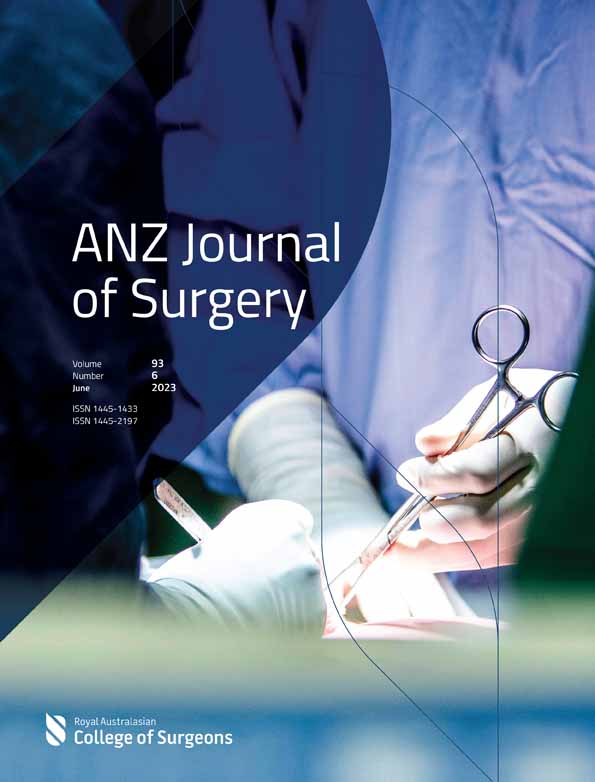Doctors' knowledge and perceptions of perioperative nutrition support; results from a large Australian tertiary referral Centre
Nutritional optimisation in the perioperative period is essential in the prevention and treatment of malnutrition, a state of poor bodily function caused by a lack of nutritional intake, thereby altering body composition.1 Although identification and treatment of malnutrition is well recognized as a key component of Enhanced Recovery After Surgery (ERAS) guidelines, it is still highly prevalent, and significantly associated with poor outcomes. Studies have shown that up to 50% of patients undergoing abdominal surgery are malnourished.2-5 These patients are further at risk due to reduced recognition, combined with poor clinician understanding of treatment strategies due to their lack of knowledge and experience.6-10
To identify how we can improve on surgical nutrition management within our surgical units, we performed a survey within a large tertiary referral hospital in Melbourne, Australia. The project was approved by the Western Health Office of Research (QA2020.13_61439). A purpose-built, 23-item anonymous online REDCap survey was distributed to all doctors (including interns, residents, registrars, fellows and consultants) working across all general surgical units at Western Health. As our recruitment strategy involved advertising the survey at the weekly surgical morbidity and mortality meeting and via email distribution, response rate calculation was not feasible. The survey, developed by a team of senior academic dietitians and surgeons, included Likert scale ‘agree/disagree’ questions as well as clinical multiple-choice questions to assess doctor's perceptions and knowledge of perioperative nutritional support within general surgery. Of the 50 respondents, the majority were junior doctors (11 [22%] interns and 17 [34%] residents), 11 were registrars (22%) and a further 11 were consultant surgeons (22%). Only 24% (12) of respondents reported any prior training on perioperative nutritional support. While all respondents agreed on the importance of perioperative nutrition training (100%) and 94% (47) agreed on the need for nutritional assessment both before and after abdominal surgery, only 46% (23) felt confident in being able to initiate enteral or parenteral support according to evidence based guidelines. This was reflected when only approximately half of respondents correctly identified the correct timing to commence enteral (62%; 31) and total parenteral nutrition (50%; 25).
Early identification of patients with nutritional deficits is important to ensure appropriate and timely interventions, however only a small proportion (20%; 10) of doctors surveyed were confident in identifying malnutrition and only 34% (17) were able to identify the common risks of malnutrition in a surgical patient. Only 38% (19) of doctors understood that the commonly used ‘fast from midnight’ order was unnecessary.11
These findings correspond with the nutritional knowledge gaps that have been observed across the world amongst medical students, junior medical staff and surgeons.6-10 Many hospitalized patients suffer from malnutrition, and those undergoing abdominal surgery, especially emergency cases, are at risk of deterioration owing to prolonged fasting and slow return to adequate nutritional intake. A recent British audit showed that patients undergoing emergency surgery are more likely to fast for longer periods of time (more than 12 h for clear fluids, and 24 h for food) compared with elective patients.11
Whilst we have shown the majority of doctors understand the importance of nutrition optimisation, they may not be equipped with the knowledge of when and how to do so. The implementation of ERAS protocols which include nutrition components can help standardize nutrition supplementation.12 A recent study also showed a lack of nutrition related education in British postgraduate training curriculums, suggesting a potential solution of implementing nutritional based objectives in all postgraduate training programs.7, 13
We recommend that doctors should be encouraged to make use of available hospital resources, in particular involvement of dietitians and the multidisciplinary team to help with early identification of patients at risk of malnutrition. Embedded education in both undergraduate and postgraduate training could help improve on doctors understanding and management of nutritional deficiencies.
Acknowledgement
Open access publishing facilitated by The University of Melbourne, as part of the Wiley - The University of Melbourne agreement via the Council of Australian University Librarians.
Author contributions
Howard H. Y. Tang: Formal analysis; writing – original draft; writing – review and editing. Danielle Taylor: Data curation; investigation; methodology; writing – review and editing. Irene Deftereos: Conceptualization; methodology; writing – review and editing. Aurora Ottaway: Methodology; writing – review and editing. Justin M. C. Yeung: Conceptualization; supervision; visualization; writing – review and editing.




